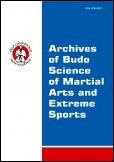2015, Volume 11, Issue 1
Cognitive and administrative barriers to the implementation of the extreme forms of physical activity in the educational system for students
Robet Bąk1, Milan Ďuriček2
1Faculty of Physical Education, University of Rzeszów, Rzeszow, Poland
2Faculty of Physical Education and Tourism, Holy Cross University in Kielce, Kielce, Poland
Author for correspondence: Robet Bąk; Faculty of Physical Education, University of Rzeszów, Rzeszow, Poland; email: robo[at]interia.pl
Full text
Abstract
Background and Study Aim: Large application potential of extreme forms of physical activity (EFPA) is confirmed in daily media reports. However, one of the basic assumptions of the Bologna Declaration is to give students freedom to select classes and university at which they will be held. The main objective of the study involved on one side knowledge on perception and preferences of academic youth from various faculties regarding EFPA and on the other hand students’ knowledge about BD criteria in order to estimate any barriers to the implementation of EFPA to the education system.
Material and Methods: The study involved 402 students from Rzeszow University, Poland. The average age of students amounted to 21.8 years. Students represented three groups of sciences: G1 - humanistic and social sciences (n = 115); G2 - exact science and engineering (n = 90); G3-life sciences (n = 179). The study involved the use of questionnaire developed by the authors. EFPA was identified on the basis of three criteria: threat to health or life (C1), coordination difficulty (C2), body burden with high level of effort (C3).
Results: Respondents pointed out to C1 as the most significant criterion to identify EFPA (78%), whereas they indicated C2 and C3 no more frequently than 30%. Knowledge about EFPA is obtained mainly from media (84%), from personal relations with other people (28%) and from their own physical activity only in 16%. Only 6% declared that they freely select classes during the studies, whereas 18% reported that they know, and 76% that they do not know the assumptions of BD and resulting application possibilities.
Conclusions: Negligible knowledge of students about the assumptions of Bologna Declaration is a substantial barrier hindering the possibility of applying EFPA. This also implies limited possibility of monitoring such expectations from students and hinders implementations.
Key words: Bologna Declaration, body burden with high level of effort, coordination difficulty, ECTS, threat to health or life





